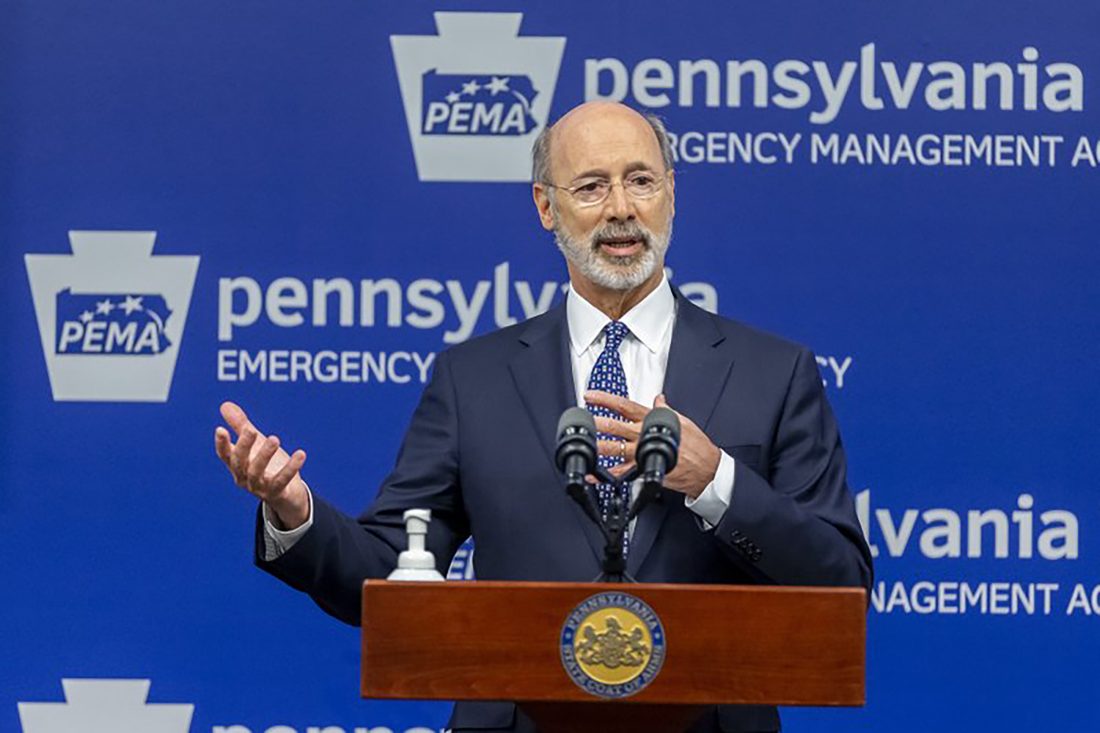Climate goals
Wolf, legislature continue RGGI fight
- AP File Photo In this file photo, Pennsylvania Gov. Tom Wolf meets with the media at The Pennsylvania Emergency Management Agency headquarters in Harrisburg.
- Representative Jim Struzzi argues for passage of HB 2025, legislation that delineates the process for legislative approval before Pennsylvania could impose a carbon tax.

AP File Photo In this file photo, Pennsylvania Gov. Tom Wolf meets with the media at The Pennsylvania Emergency Management Agency headquarters in Harrisburg.
A House committee has opposed Gov. Tom Wolf’s plan to have Pennsylvania join the Regional Greenhouse Gas Initiative.
On Tuesday, the House of Representatives’ Environmental Resources and Energy Committee passed House Resolution 1088, sponsored by Rep. Jim Struzzi, R-Indiana. House passage of the resolution would mean the resolution is would be sent to the Independent Regulatory Review Commission as the House’s formal disapproval of Wolf’s plan.
“If Pennsylvania joins RGGI, we will quickly see thousands of family-sustaining jobs lost in our Commonwealth due to the closure of coal-fired electric generating units and older natural gas plants. The economic repercussions would be felt throughout Pennsylvania as we see thousands of jobs and millions of dollars in local and state tax revenue lost,” Struzzi said. “The jobs that we lose will go directly to our neighboring states who are not a part of RGGI, and our remaining natural gas-fired plants will be put at a competitive disadvantage because of our participation.”
In January 2019, Wolf signed an executive order to set Pennsylvania’s first statewide climate goals, aiming to reduce greenhouse gas emissions by 26% by 2025 and by 80% by 2050, compared to 2005 levels. Then, in October 2019, Wolf issued an executive order directing the Pennsylvania Department of Environmental Protection to begin the process of joining RGGI in October 2019, establishing a regional cap on the amount of carbon dioxide pollution that power plants in Pennsylvania can emit by establishing a trading system. Each unit of trade, known as an allowance, would represent authorization for a power plant to emit one short ton (2,000 pounds) of CO2. Power plants in RGGI member states can trade allowances, preventing the total amount of CO2 emissions in the region from increasing. RGGI would also establish a carbon tax on fossil fuel users for the resulting CO2 emissions.
See FIGHT / A-3

Representative Jim Struzzi argues for passage of HB 2025, legislation that delineates the process for legislative approval before Pennsylvania could impose a carbon tax.
Wolf’s executive order prompted state legislators to pass House Bill 2025, also authored by Struzzi, to require legislative approval before Pennsylvania could join RGGI or any similar multi-state compact. The General Assembly had passed the bill with bipartisan majorities of 130-71 in the House and 33-17 in the Senate. Wolf vetoed the measure on Sept. 24, saying the House bill didn’t do anything to address climate change while stopping an executive order that Wolf said has extensive public participation.
“This legislation creates burdensome and duplicative processes that will thwart the Department’s ability to take any action to regulate the greenhouse gas most responsible for climate change in the transportation, industrial, and commercial sectors, as well as the electric power sector,” Wolf said in his veto message. “The citizens of this Commonwealth cannot afford to wait any longer. Given the urgency of the climate crisis facing Pennsylvania, the Commonwealth must take concrete, economically sound, and immediate steps to reduce greenhouse gas emissions. Allowing this legislation to become law would effectively deny that climate change is an urgent problem that demands prudent solutions.”
Struzzi, however, argued that RGGI is a tax, and that taxes can only be levied with legislative approval.
“A carbon tax such as RGGI can only be initiated by the General Assembly,” Struzzi said. “This initiative is a major energy and fiscal policy decision, which must be made by the legislative branch of government with the input of the people.”




